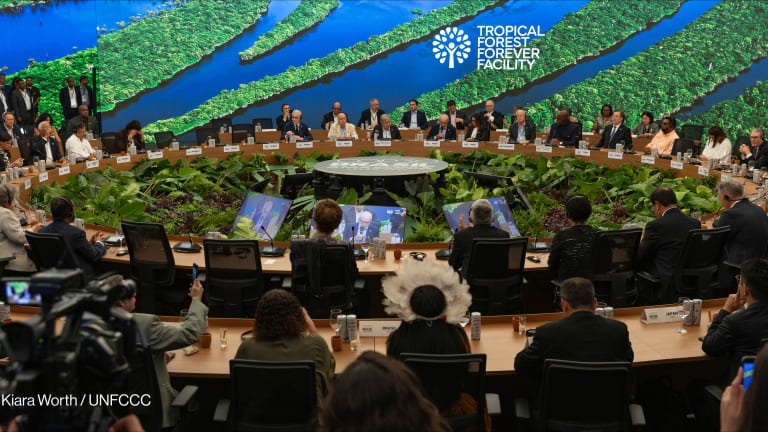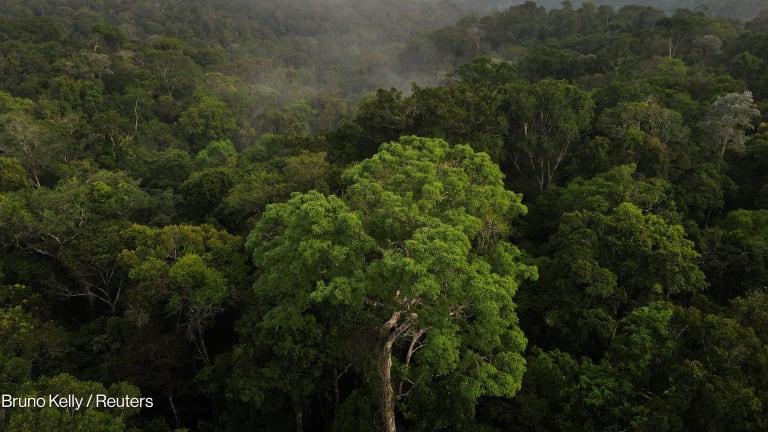Why Norway’s $1B agreement to protect Indonesia's forest failed
As COP 26 gets underway, the failure of what was a groundbreaking pledge puts attention on the need to quickly and efficiently scale up climate financing for protecting tropical forests and other high-carbon landscapes.
In 2010, to much fanfare, Norway announced a $1 billion pledge to protect Indonesia’s critically important tropical forests. After years of work, in 2019, the effort, part of the United Nations Reducing Emissions from Deforestation and Forest Degradation program, known as REDD+, announced that it was ready to distribute funds. But then, in September of this year, Indonesia’s Ministry of Foreign Affairs abruptly stated it was ending the pact, blaming Norway for nonpayment. It was a setback for REDD+, deforestation efforts, and Norway’s climate and development finance goals. “We believe that both governments should be questioned on their motives and commitment to deforestation,” said Arkian Suryadarma, a senior forest campaigner at Greenpeace Indonesia, via email. While he believes that while Indonesia certainly could have done more around transparency and governance, Norway is also partly responsible. “The REDD+ agreement should have been [Norway’s] gateway to push the Indonesian government to fulfill their target of reducing emissions by 40 percent with international aid, but this was not the case,” he said. As COP 26 is underway, the failure of what was a groundbreaking pledge puts attention on the need to quickly and efficiently scale up climate financing for protecting tropical forests and other high-carbon landscapes. Land-based emissions make up about a quarter of all emissions, according to the Intergovernmental Panel on Climate Change, and Indonesia is one of its leading sources. Tropical deforestation and peatland degradation in Indonesia are connected to the expansion of cities, the building of infrastructure, and palm oil and paper pulp agribusiness. REDD+ aimed to counter that by providing direct payments for verified reductions in deforestation and land-based emissions. “Preserving the rainforest is vital for reducing the worst effects of climate change and halting the loss of important biological diversity,” Tørris Jæger, secretary-general at Rainforest Foundation Norway, told Devex via email. “The world needs partnerships to speed up efforts for these valuable rainforests.” A missed opportunity In 2012, Indonesia overtook Brazil to have the highest rate of deforestation in the world, with 840,000 hectares of forest lost. In 2015, Indonesia’s forests again made global headlines as massive fires burned through 2.6 million hectares (6.4 million acres) of land, emitting as much greenhouse gasses as Germany’s annual emissions. After its announcement in 2010, the Norway REDD+ project faced significant challenges in getting set up. Despite implementing a deforestation moratorium the following year, Indonesia’s forest governance was lacking, with deforestation still common. Creating a system to monitor and verify forest protection was one challenge, as was creating a system to manage payments. That meant that several years after the announcement, no payments for forest protection had been distributed by Norway to Indonesia. “There was genuine disagreement on some critical points,” said Arild Angelsen, a professor of economics at the Norwegian University of Life Sciences. “We witnessed long negotiations about the conditions for the transfer of REDD+ money.” A key issue, according to Angelsen, was defining “results-based” payments, and recipient discretion on distributing those payments. “The government of Indonesia put strong emphasis that the recipient decides how to achieve results and how to spend the payment,” said Angelsen. “But the payment from Norway is from the development aid budget, and that creates additional requirements … authorities should be able to follow the money and check if they are spent well.” Despite this, Angelsen expressed surprise that the agreement was canceled. “Indonesia needs to prove, and not just tell the world, that it is still committed to combating deforestation, regardless of Norway’s funding.” --— Bruce Muhammad Mecca, analyst, Climate Policy Initiative’s Indonesia office “It’s disappointing and a major blow for the international REDD+ efforts and the Norwegian forest climate initiative,” said Angelsen. He hopes that the relationship can be repaired and that both sides can find a way to renew the pact. “Indonesia needs to realize that a donor country like Norway has requirements on how aid is spent, and Norway should recognize national sovereignty,” said Angelsen.”In the end, it’s about finding an acceptable compromise between the two.” Similarly, Arief Wijaya, the senior manager for climate, ocean, and forest at the World Resources Institute Indonesia, hopes that both governments will return to the table. “One could also see this termination as a signal that both governments could move towards a new agreement that better suits current political and socio-economic circumstances, especially the COVID-19 pandemic,” he said. More than REDD+ While $1 billion sounds like a lot, in fact, it’s relatively small, said Bruce Muhammad Mecca, an analyst at the Climate Policy Initiative’s Indonesia office. According to Mecca, the first payment — due this year — was expected to be $56 million, pricing carbon at the relatively low figure of $5 per ton. The risk to Indonesia is more reputational, as it may lead other potential investors in REDD+, or similar climate finance programs, to look elsewhere. “Indonesia needs to prove, and not just tell the world, that it is still committed to combating deforestation, regardless of Norway’s funding,” said Mecca. While Norway’s project was the largest and most visible, it was, in fact, one of many REDD+ projects looking to enhance forest protection, added Mecca. This includes $103.8 million from the Green Climate Fund, $60 million from the BioCarbon Fund, and — signed in December last year — $110 million from the World Bank’s Forest Carbon Partnership Facility, which remains committed despite last month’s news, according to André Rodrigues de Aquino, the World Bank’s senior natural resources management specialist. “The agreement entails a robust set of methodology to verify emission reduction units, clear guidelines and timeline, and a Benefit Sharing Plan that has been agreed by the World Bank and the Government of Indonesia,” said Rodrigues de Aquino. “Highlighting Indonesia’s critical role in providing nature-based solutions and mobilizing finance to fund and incentivize emissions reduction would be two of the key goals ahead of COP 26.” In fact, REDD+ remains central to global efforts to reduce land-based emissions, and advocates believe it can be reformed to be more effective and more efficient. Simply stated, a system that makes low- and middle-income countries wait upwards of 10 years for the first payments is not only a burden but also isn’t in line with science-based global climate targets. As for Indonesia, the country can still take advantage of investments Norway did make in improving forest governance over the past decade. “One of the key challenges facing forest climate finance is ensuring integrity and a fair incentive mechanism. Countries that continuously improve the integrity of emission reductions will boost confidence and attract finance from a wide array of actors,” said Mecca. “If Indonesia focuses on those, it can be positive for the country’s climate goals.”
In 2010, to much fanfare, Norway announced a $1 billion pledge to protect Indonesia’s critically important tropical forests. After years of work, in 2019, the effort, part of the United Nations Reducing Emissions from Deforestation and Forest Degradation program, known as REDD+, announced that it was ready to distribute funds.
But then, in September of this year, Indonesia’s Ministry of Foreign Affairs abruptly stated it was ending the pact, blaming Norway for nonpayment. It was a setback for REDD+, deforestation efforts, and Norway’s climate and development finance goals.
“We believe that both governments should be questioned on their motives and commitment to deforestation,” said Arkian Suryadarma, a senior forest campaigner at Greenpeace Indonesia, via email. While he believes that while Indonesia certainly could have done more around transparency and governance, Norway is also partly responsible.
This story is forDevex Promembers
Unlock this story now with a 15-day free trial of Devex Pro.
With a Devex Pro subscription you'll get access to deeper analysis and exclusive insights from our reporters and analysts.
Start my free trialRequest a group subscription Printing articles to share with others is a breach of our terms and conditions and copyright policy. Please use the sharing options on the left side of the article. Devex Pro members may share up to 10 articles per month using the Pro share tool ( ).
Nithin Coca is a Devex contributing reporter who focuses on social, economic, and environmental issues in developing countries, and has specific expertise in Southeast Asia.








